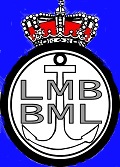

DOSSIER
- Welcome
Accueil - Nieuws
Nouvelles- 26/11 Lower shipping emissions may lead to higher global temperatures
- 28/11 Prosecutors Seize Potentially Toxic Cargo from Cargo Ship Off Albania
- 30/11 President Biden Urges Foreign-Owned Port Employers to Improve Offer and End Dockworker Strike
- 03/12 Zombie Tanker Turns Up at Northern Chinese Port Laden With Oil.
- 05/12 Seafarer happiness has improved as sea time increased due to diversions away from Red Sea routes
- 07/12 Proposed IMO revenue generation mechanisms risk creating 'haves and have-nots', says NGO
- 10/12 Zenobe Gramme
- 12/12 Tweedaagse NAVY TECHNOFest toont Marine van de toekomst
- 14/12 Scheepvaartgroep CMB trekt stekker uit Maritieme Campus in Antwerpen
- 17/12 Prepare for attacks, best regards, says Houthi militia’s email to Red Sea ships
- 19/12 Mediterranean ECA to impact tanker trades
- 22/12 End of an Era: Historic SS United States Transferred to New Owners
- Kalender Calendrier
- BML Nieuws
LMB Nouvelles - Historiek
Historique- 18/11 De schipbreuk van de kotter Princess of Wales en de schoener l'Aventure (I)
- 25/11 De schipbreuk van de kotter Princess of Wales en de schoener l'Aventure (II)
- 02/12 Bereikten de Chinezen 70 jaar voor Columbus Amerika?
- 08/12 Een beetje geschiedenis (I)
- 15/12 Een beetje geschiedenis (II)
- 21/12 Een beetje geschiedenis (III)
- Dossier
Dossier
- 24/11 Red Sea gives shipping an Uber-style price surge
- 27/11 The Bridge: A Systems View.
- 29/11 False engine alarm causes collision
- 01/12 LNG as fuel for ships: expert answers to 17 important questions
- 04/12 50 years of keeping ships in business
- 06/12 Stricter inspections for tankers and bulkers
- 09/12 Court of Appeals Calls FMC “Illogical” Awarding D&D Fee Win to Evergreen
- 11/12 Shell 'pauses' Rotterdam SAF facility 'to assess the commercial way forward'
- 13/12 Driving efficiency and trust: DNV’s Emissions Connect in the new EU ETS landscape
- 16/12 MacGregor electric deck systems prove optimal for bulk carrier operations
- 18/12 Could Future Naval Battles Be Fought With Morse Code?
- 20/12 Corrupt port officials: what we all do to get by
- 23/12 Decarbonisation’s negative impact on seafarer workload and stress
- Raad
Comité - Verenigingen
Associations - Contacten
Contacts - Links
Liens - Boeken
Livres - Archives
Archieven- Archieven 1 - Archives 1
- Archieven 2 - Archives 2
- Archieven 3 - Archives 3
- Archieven 4 - Archives 4
- Archieven 5 - Archives 5
- Archieven 6 - Archives 6
- Archieven 7 - Archives 7
- Archieven 8 - Archives 8
- Archieven 9 - Archives 9
- Archieven 10 - Archives 10
- Archieven 11 - Archives 11
- Archieven 12 - Archives 12
- Archieven 13 - Archives 13
- Archieven 14 - Archives 14
- Archieven 15 - Archives 15
- Archieven 16 - Archives 16
- Archieven 17 - Archives 17
- Archives 18 - Archieven 18
- Archieven 19 - Archives 19
- Photos
Foto's
Could Future Naval Battles Be Fought With Morse Code?
At the 3rd Indo-Pacific Security Conference 2024, held today at the Bundeswehr Command & Staff College in Hamburg, Germany, a question arose about the ability of navies to protect tankers and replenishment oilers in the event of war in the Western Pacific.
Steve Carmel, a former Vice President for Maersk LLP said the United States Merchant Marine is at least 100 tankers short of meeting basic energy needs in the event of war in the Pacific, it will therefore be incredibly important to protect the few tankers and oilers we do have in the Pacific.
There are, however, a few major problems. Neither US Merchant Marine tankers or Military Sealift replenishment oilers have anti-air weapon systems to shoot down enemy missiles or drones.
Second, Navy oilers undergo regular maintenance at American repair shipyards but many commercial oil tankers- which will be required to refuel overseas oil storage facilities and forward air bases – are increasingly being repaired at Chinese yards leading some to question if spyware or remote shutdown systems could be installed while systems are down.
Third, Navy owned oilers have secure communication systems to coordinate with naval warships but commercial oil takes do not.
These vulnerabilities were raised in a question at the event. A senior flag officer from a major NATO Navy overlooked the potential cybersecurity threats but addressed the other two issues.
He stated that protecting Merchant Shipping over such a vast area is a challenging issue. Even if merchant ships are convoyed, a drone swarm or a barrage of missiles could still overwhelm the defenses of convoy frigates.
Communication poses a significant challenge too. The flag officer noted that even sophisticated communication systems on advanced warships can be jammed by equipment on enemy facilities and ships. As a result, convoys and even battle groups might have to rely on Morse code via blinker lights.
Although seemingly old-fashioned, this method provides a dependable way to communicate, less prone to electronic warfare. Blinker lights transmitting Morse code allow vital information to be sent even during intense jamming. This highlights the need to maintain traditional communication skills alongside modern technology.
The officer, who cannot be named due to Chatham House media rules, states that he has ordered his nation’s warships to practice using blinker lights during realistic sea exercises. He encouraged other NATO navies to follow suit.
A senior officer from a smaller NATO Navy encourages allies to explore both innovative and low-tech solutions for merchant ship defence. This could include installing non-lethal anti-drone systems, such as jammers, on merchant ships. He also mentioned that discussions should begin about equipping ships with anti-aircraft guns, reminiscent of those used during World War II.
LMB-BML 2007 Webmaster & designer: Cmdt. André Jehaes - email andre.jehaes@lmb-bml.be